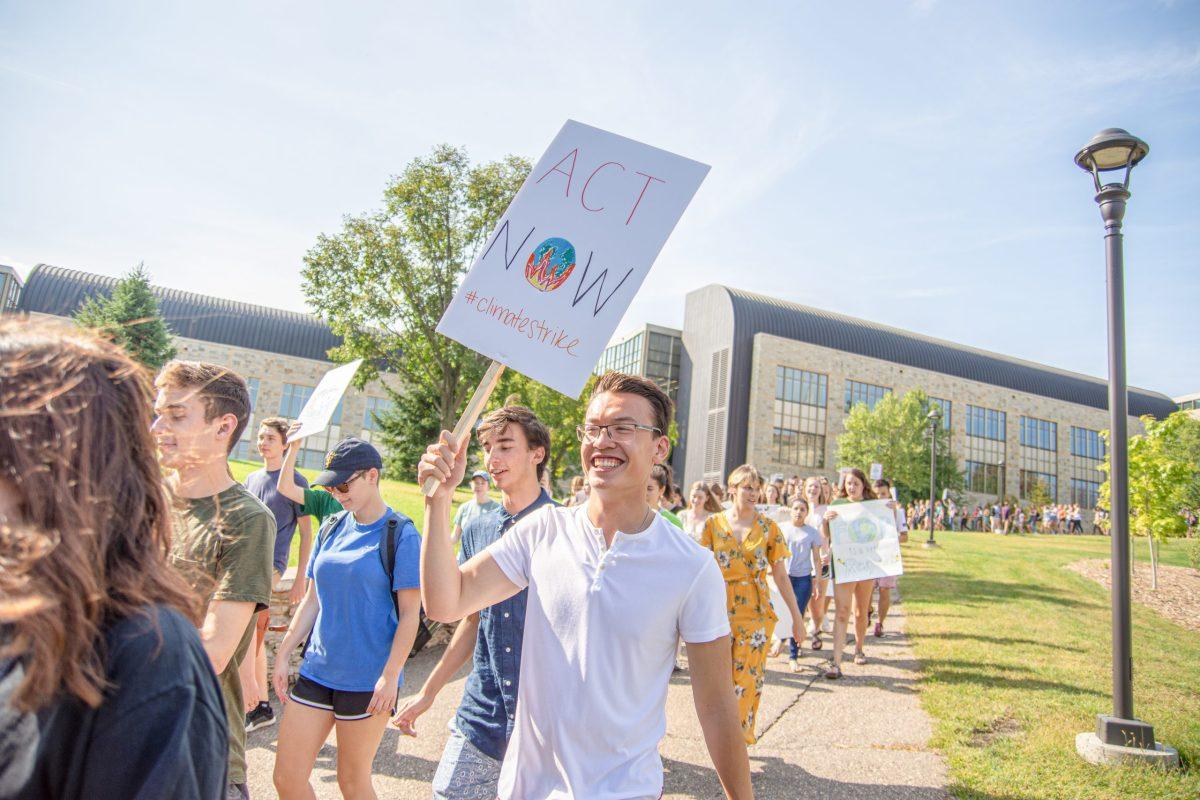Anti-Protest
The recent climate strike and all climate change protests before it have been futile and silly. Protests have caused no major policy changes, and the plastic straw activism that’s been trending recently has just added on to how ridiculous the cause is.
People attending these protests and making clever signs for Instagram pictures have done nothing substantial to educate the people who don’t believe in climate change, and they certainly will not convince conservative politicians to change their votes.
U.N. scientists claim there is only a decade left to effectively reverse climate change. Saving the turtles, despite sounding fun and cute, will save literally no one. The extreme air and water pollution that causes animals to die and temperatures to rise is not caused by average American citizens. It is caused by big corporations.
The Carbon Disclosure Project’s (CDP) Carbon Majors Report of 2017 showed that, since 1988, 100 fossil fuel companies are linked to over 70% of the world’s greenhouse gas emissions. Fossil fuel companies like ExxonMobil, Shell and Chevron are among the top contributors to the looming climate catastrophe.
The report also notes that if carbon emissions rise at the same rate over the next three decades as they did during the last three, worldwide temperatures will rise by 4° Celsius by the end of the century.
ExxonMobil is not going to dismantle itself just because a few million people across the world walk around for a week. People will still buy gas and other harmful products because they have to. Until major reform happens that actually prevents big companies from devastating our planet, nothing really matters.
If you really wanted to save the planet, you would overthrow the American or Chinse president and force their politicians and companies to surrender their money and resources in return for clean energy. If you really wanted to save the planet, you would personally go after the CEOs of the companies on the CDP report’s list.
Unfortunately, the CEOs will continue to stay in their place and damage the planet while politicians stand idly by. The death of the planet is inevitable unless conservatives take a strong stand against big companies in the next few years.
Being vegan or using metal straws or protesting is great, but it is not going to save the planet. What can we do as average citizens? Politicians and world leaders have the power to take down dangerous corporations, so just vote against candidates who support those corporations.
Other than that, nothing will save the planet. The protests will not stop the hurricanes or rising temperatures, and they certainly will not inspire conservative politicians to vote against their donors.
[email protected]
Karen Larionova ’23 is from Eden Prairie, Minn. Her major is undecided.
Pro-Protest
By Isaac Nelson
The email I sent to faculty and the St. Olaf Extra email alias, titled, “On the Purpose of a Strike,” has garnered a number of responses and hopefully sparked many conversations throughout the St. Olaf community. The email called on students and professors to approach last week’s climate strike with the severity it deserved and to refuse to go about their normal business all day instead of just during the strike. I would like to take some time to clarify what I really meant by that message, address some concerns people had with it and lay out what I believe are the next steps.
So what was my intent? I believe that St. Olaf students often have trouble viewing our lives within a larger political and historical context. We get swept up in the “Oles can, Oles will” mentality that pressures us to strive for academic excellence at the expense of our own health and critical reflection on our lives. I was attempting to crack through this mindset and force people to reflect on their own reason for striking (or not striking) and the impact their actions would have.
I received constructive criticism from some faculty and students that my message served to exclude some people from participating in a variety of ways. There are people, for example, who may not have attended the strike because they needed to work in order to support themselves and striking might have put their jobs at risk. Others might experience anxiety over being in large crowds and still others may have been uneasy with the presence of police or other forms of law enforcement at the strike. It was not my intent to exclude anybody with such concerns from participating in the climate justice movement, yet I acknowledge that this may have been the effect. For this I apologize.
The past 200 years have been characterized by rampant and reckless consumption of fossil fuels which now jeopardizes the survival of life as we know it. These centuries have also been defined by the evolution and development of white supremacy, capitalism, patriarchy, ableism and other forms of oppression. None of these emerged in a vacuum. They developed together, amplifying and perpetuating each other. Knowing this, any project that aims to stop or mitigate ecological destruction must also dismantle other forms of oppression, lest it entrench existing power structures.
Environmentalism has a history of excluding many marginalized groups – anyone with ties to the environmental movement should be careful not to recreate these conditions. With this in mind, I still believe that the climate justice movement should be vigilant that it does not become so inclusive that it loses sight of its transformative vision. If we bend over backwards to ensure that everybody feels comfortable, we risk forgetting the values on which the movement is founded.
I do not believe the answer is to tone down our message or our demands in order to make everyone feel comfortable. Instead, our starting point must be to build coalitions across movements. Doing so will reflect the intersectional nature of a problem like climate change and can ensure that the needs of vulnerable people are put first. If done well, working people, immigrants, climate activists and others will understand that they each have a stake in the others’ liberation.
So what now? Whether the climate strike lives up to its potential is yet to be seen. This question will be answered by our ability to channel the strike’s energy forward to create the kinds of coalitions on campus and in Northfield that will be liberating. To do this, we must connect issues like student food insecurity to inadequate mental health services. We must connect St. Olaf’s likely investment in fossil fuel corporations (though we aren’t allowed to know for sure) to the fact that the school does not acknowledge that it rests on stolen Dakota land. There are many more issues on this campus, but I hope this illustrates how broad our partnerships can be. So let us deeply question our values and the institutions which perpetuate injustice, imagine alternatives and begin to enact them in the world.
Isaac Nelson ’21 is from Eagan, Minn. His majors are environmental studies and race and ethnic studies.



